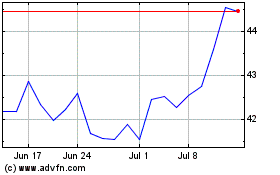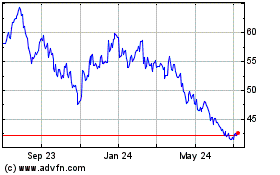By Orr Hirschauge
Argus Cybersecurity Ltd., a Tel Aviv-based firm that makes
software to protect cars from hackers, has raised $26 million in
its second funding round, amid growing concerns among auto makers
and insurers about how to protect onboard electronic systems from
cyberattacks.
The latest funding round by Argus brings the total amount the
two-year-old company has raised to $30 million.
Among the company's new investors are Canada-based automotive
supplier Magna International Inc. and German insurance company
Allianz SE.
"Only a year ago manufacturers we were talking to weren't all
that clear about the need for cybersecurity systems in cars. Now,
it is a priority for most," said Ofer Ben-Noon, Argus's co-founder
and chief executive.
Founded by veterans of the Israeli army's Unit 8200--the
equivalent of the National Security Agency--Argus makes software
that scans messages traveling between a car's electronic control
units to see if malicious software has infected any of them.
For instance, when a car's tire-pressure monitoring system
relays data over a Bluetooth connection to the vehicle's internal
communication network, Argus' software detects and blocks messages
that are possibly coming from an exterior source.
Malicious software from the outside can make its way into a
car's onboard computer systems in various ways, including hacking
into the part of the computer which acts as a gateway to the
surrounding mobile network.
Argus' algorithms keep tabs on these messages to detect whether
any of them going through the car's internal systems show any signs
of abnormality. They might check to see if the messages correspond
to the usual content and timing when the vehicle is operating
normally.
The company's software can be embedded into existing onboard
hardware, or run as a separate piece of software, for instance,
through the car's infotainment system's operation system.
The product is currently under examination by various car
manufacturers, but hasn't been commercially released yet, Argus
said. Argus said it is possible a stand-alone product won't be
required, as some car manufacturers could integrate the software
directly into their onboard systems.
Argus's successful funding round suggests growing awareness of
the threat to today's increasingly computer-powered--and
Internet-connected--cars. By 2020, there could be a quarter of a
billion connected vehicles on the road, according to research
company Gartner.
Car manufacturers, insurance firms, and cybersecurity companies
are taking notice particularly after recent demonstrations of the
vulnerability of automotive systems.
In July, two researchers showed how they could take control of a
moving Jeep Cherokee by hacking into the car's UConnect multimedia
system, and taking control of the car's transmission system,
disabling the car's brakes and shutting down the car's engine.
That same week, senators Edward Markey (D., Massachusetts) and
Richard Blumethal (D., Connecticut) introduced a new Senate bill
that seeks to set federal standards for cybersecurity in cars. The
issue is also being looked at by two congressional committees.
After the hacking incident, Fiat Chrysler Automobiles NV, owner
of the Jeep brand, recalled 1.4 million vehicles. The hackers were
subsequently hired by Uber Technologies Inc. to work on security
for the fast-growing car-hailing company's self-driving car
project.
In 2014, Argus itself showed how its experts can take control of
a car remotely, hacking into a device by South Carolina based Zubie
Inc., a supplier of devices that connect to car systems and send
data for insurance or safety uses. Argus hacked into the device
using a remote computer that took on the identity of the server
with which the onboard device normally communicates. Zubie later
fixed that vulnerability.
Argus says it is also working with car-parts manufacturers like
Magna International.
The company currently employs 24 people in offices in Tel Aviv,
Stuttgart, Tokyo, Michigan and California.
At least three other automotive cybersecurity startups have
sprung up in Israel in the last three years, including TowerSec
Ltd. and Arilou Information Security Technologies Ltd., which both
develop intrusion-prevention technologies for cars. The other is NG
Security in Motion Ltd., which develops antivirus software for
automotive infotainment systems.
A few months ago Israel-based information security vendor Check
Point Software Technologies Ltd., one of the world's largest
cybersecurity companies started offering a service called Check
Point Car Capsule that secures outgoing and incoming cellular data
in connected cars.
As well Magna International and Allianz, Argus's new investors
include Japanese financial services group SBI Group. Participating
in the new financing round are current Argus investors, including
Israel-based venture funds Magma Venture Partners and Vertex
Venture Capital, as well as Zohar Zisapel, co-founder of the
Israeli networking and telecommunication technologies provider RAD
Group.
Write to Orr Hirschauge at Orr.Hirschauge@wsj.com
Subscribe to WSJ: http://online.wsj.com?mod=djnwires
(END) Dow Jones Newswires
September 10, 2015 10:35 ET (14:35 GMT)
Copyright (c) 2015 Dow Jones & Company, Inc.
Magna (NYSE:MGA)
Historical Stock Chart
From Mar 2024 to Apr 2024

Magna (NYSE:MGA)
Historical Stock Chart
From Apr 2023 to Apr 2024
